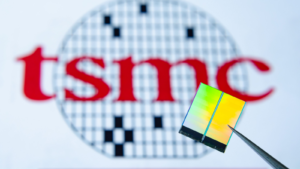Let’s be realistic, overall turmoil in the markets is likely far from over at this point. The Federal Reserve just raised interest rates 75 basis points, its fourth such consecutive increase, and Jerome Powell signaled more trouble ahead. Although Powell suggested smaller incremental increases ahead he also stated rates could rise to higher levels than previously anticipated. That suggests inflation worries will be more persistent and that turmoil in the markets is far from over.
None of that even considers the rising likelihood of a 2023 recession. Greater numbers of influential voices are conceding that a 2023 recession is coming. None of the above suggests tech will run sharply higher for any sustained period of time.
That said, there are still cheap tech stocks worth buying. One can argue that many inexpensive tech stocks currently have worst-case scenarios priced in. Therefore, they are likely to fall much farther. Let’s look at some of those equities.
Cheap Tech Stocks: Applied Materials (AMAT)

On the one hand, Applied Materials (NASDAQ:AMAT) stock is at the forefront of the global economic downturn. The semiconductor manufacturing equipment, services, and software provider has suffered this year. Inflation and slowing global growth have crushed demand for big-ticket items that include all things semiconductors. Not good for Applied Technologies and AMAT stock.
That has resulted in the company revising guidance downward. Case in point, on Oct. 12 it revised its upcoming guidance downward from $6.65 billion to $6.4 billion.
One of the simplest, and most compelling arguments in favor of AMAT stock is its price-to-earnings (P/E) ratio. At 13.76, it ranks better than roughly 60% of industry competitors which have a median of 15.5. Applied Materials’ P/E ratio is well below its 10-year median as well. That’s true of everything as valuations have plummeted with rising interest rates. But it remains a positive nonetheless.
The other compelling aspect of AMAT stock is that it provides a dividend that hasn’t been reduced since 2005. In short, AMAT is a defensive stock among tech names given the income its dividend provides.
Seagate Technology (STX)

Seagate Technology (NASDAQ:STX) stock represents the Dublin-based data storage products and services firm. It is worth buying for many of the same reasons that Applied Materials is worth buying.
Like AMAT stock, STX stock includes a dividend. However, Seagate’s dividend yields a much higher 5.77% at present. That would be considered high in most industries. It is particularly high in growth-oriented tech stocks that rarely pay dividends, period.
Interestingly, Seagate has not slashed that dividend for more than a decade either.
Revenue declined from $3.115 billion to $2.035 billion in the most recent quarter. Net income fell from $526 million to $29 million in the same period. The company is restructuring as a result. It is laying off 8% of its workforce. It expects the move to cost as much as $70 million resulting in $110 million in overall savings. Essentially, any current investor is betting Seagate will come out leaner and meaner while relying on its high-flying dividend to ease their worries.
Cheap Tech Stocks: Taiwan Semiconductor Manufacturing (TSM)

Taiwan Semiconductor Manufacturing (NYSE:TSM) stock, like the two above, also includes a dividend. The same defensive argument applies to it as well. The company’s size, importance, and fundamentals make it worth buying.
Fortunately, it’s cheap right now. That’s the collective opinion of Wall Street. Of the 36 analysts with coverage, 30 have given it a buy rating. Its current price is $60 and it carries a target price above $86. In short, analysts expect it to appreciate 43.54% over the next year to year-and-a-half.
Taiwan Semiconductor Manufacturing is the world’s largest foundry. Its 5-nanometer process technology makes it a leader as other firms can’t keep up. It launched limited 3-nanometer chips as well. South Korea’s Samsung is the only other competitor in the space so far.
The U.S. is trying to onshore chip production as Taiwan-China-U.S. tensions rise. But the safe bet is to assume TSMC will continue to dominate and play a major role. Its technological prowess and scale make that a near certainty. Further, U.S. firms won’t be able to replicate the manpower advantages Asian firms have. Thus, TSM remains a safe bet.
Chegg (CHGG)

Chegg (NYSE:CHGG) and its stock have had a whirlwind 6-month period. In early May, the outlook for the online-learning platform operator was bleak.
Back then, it appeared that students were choosing jobs over college. CEO Dan Rosensweig warned that people would focus less on training as inflation worries mounted. He lowered profit guidance by $35 million, and CHGG stock plummeted as a result. At the same time, Rosensweig noted he expected the trend to be temporary.
Fast forward six months, and looks to be the case. Q3 earnings, released in early November, surprised investors positively. Revenue reached $164.7 million beating the $158.3 The firm’s EBITDA reached $50 million, well above the $37.1 million Wall Street expected.
On top of that, subscriber numbers jumped 9% on a year-over-year basis. Chegg is near its target price currently. However, the company has provided earnings beats in each of the past four quarters. If it continues to do so, analysts will revise upward and prices should rise overall.
Cheap Tech Stocks: Hackett Group (HCKT)
The Hackett Group (NASDAQ:HCKT) and its stock are relatively unknown. The company engages in business and technology consulting and has strong fundamentals behind it.
Its Q2 earnings, combined with a few fundamental metrics, make it worth considering.
Further, it has a strong upside potential of 40% based on its target price and current price.
Hackett Group posted Q2 revenue of $75.9 million. That represented a 4% increase and exceeded the high end of guidance. Those results were impressive in and of themselves. But Hackett Group also boasts other notable characteristics. The firm has no outstanding debt and a cash balance of $61.7 million. In short, it remains flexible and highly solvent.
Further, Hackett Group is exceptionally strong at investing capital. Its return on invested capital is 33.74%. That’s better than 93% of industry competitors and far higher than its 5.74% cost of capital. In short, the company turns invested capital into much greater amounts of capital.
Adobe (ADBE)

It’s been a wild ride for Adobe’s (NASDAQ:ADBE) stock and shareholders over the past year. Share prices have ranged from as high as $699 to as low as $274. Shares of the digital marketing giant currently trade for $326. Wall Street is wavering on its prospects, but give it a target price of $364.93 at the same time.
One current catalyst for the company is its planned acquisition of Figma. The $20 billion deal is facing scrutiny as Department of Justice (DOJ) regulators weigh competition and monopoly considerations.
Adobe, as could be expected, stated the two are not competitors. The company remains steadfast in its belief that a merger will occur in 2023.
So, ADBE stock has every chance to move upward if and when the Figma deal happens. The company has been extremely profitable over the past 10 years. It will continue to see high margins on the digital products its sells and that makes it valuable despite rising interest rates.
Cheap Tech Stocks: Yalla Group (YALA)

Yalla Group (NYSE:YALA) stock is a relatively fast-growing, cheap tech play that is profitable. The Dubai-based firm operates a voice-centric social and entertainment platform.
The fundamentals underpinning the company are very good. Revenues reached $76.1 million in Q2, up 14.2% YoY. That’s not particularly surprising given that tech growth firms often report similar numbers. What may surprise investors is that the company recorded a positive net income of $20.353 million. That represented a nearly $2 million increase on a year-over-year basis.
The company is dealing with increasing costs that continue to drive income lower. However, it continues to post similar net income in a growth-first tech sector where income is not a given.
The stock is cheap based on a P/E ratio of about eight which makes it far less expensive than its competition. The company saw its monthly average user base increase from just over 22k to nearly 30k in Q2 while paying users increased overall and as a percentage.
On the date of publication, Alex Sirois did not have (either directly or indirectly) any positions in the securities mentioned in this article. The opinions expressed in this article are those of the writer, subject to the InvestorPlace.com Publishing Guidelines.

